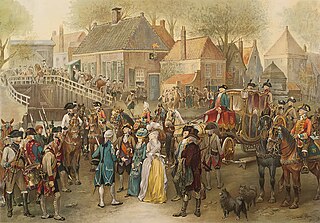
The Patriottentijd was a period of political instability in the Dutch Republic between approximately 1780 and 1787. Its name derives from the Patriots faction who opposed the rule of the stadtholder, William V, Prince of Orange, and his supporters who were known as Orangists.
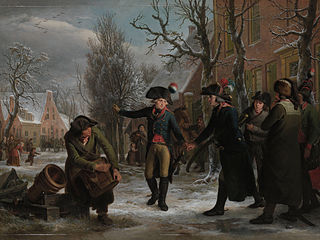
The Batavian Revolution was a time of political, social and cultural turmoil at the end of the 18th century that marked the end of the Dutch Republic and saw the proclamation of the Batavian Republic.
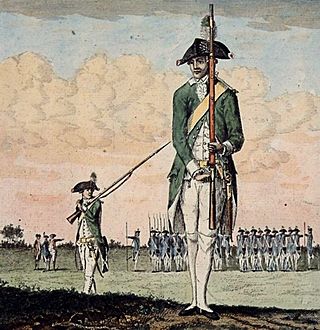
An exercitiegenootschap or militia was a military organisation in the 18th century Netherlands, in the form of an armed private organization with a democratically chosen administration, aiming to train the citizens and the lower bourgeoisie in use of muskets. Exercitiegenootschappen were propagated by Joan van der Capellen tot den Pol, who translated an old book (1732) by Andrew Fletcher on arming a nation's citizens and so got the idea from Scotland. He also saw them as necessary due to the serious decline in the existing, Orangist schutterijen.

Pieter Paulus was a Dutch jurist, fiscal (prosecutor) of the Admiralty of the Maze and politician. He was one of the ideologues of the Dutch Patriot movement and is considered by many Dutch as the founder of their democracy and political unity.

Samuel Iperuszoon, Knight Wiselius was a successful Dutch lawyer and a prominent Patriot and democrat, involved in the dismantling of the Dutch East India Company (VOC) and the negotiations over the Cape. Wiselius was a witty, Voltairian spirit with political views far ahead of his time who would end his days writing dramas on Classical themes. Wiselius corresponded with nearly all the main players at the time of the Batavian Republic and it would be impossible to know that period completely without his carefully kept and neatly written correspondence. He was also a poet, historian and superintendent of the police.

Corneli(u)s Rudolphus Theodorus, Baron Krayenhoff was a physicist, artist, general, hydraulic engineer, cartographer and – against his will and for only a short time – Dutch Minister of War.
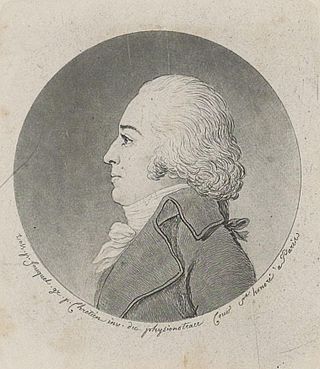
Pieter Philip Jurriaan Quint Ondaatje was an illustrious Dutch patriot and influential revolutionary politician at the end of the 18th century. Ondaatje is regarded as a pioneer of Dutch democracy. When Utrecht was besieged by States army troops he allied himself with Rhinegrave von Salm, entrusted with the defence Holland and Utrecht. At the end of 1787 he lived as refugee in Brussels and French Flanders. From 1795 he served the Batavian Republic and in 1806 the Kingdom of Holland. Up to the Hundred Days he worked in Paris.

The Batavian Revolution in Amsterdam refers to the transfer of power in the city of Amsterdam on 18 January 1795 to a Revolutionary Committee of the new Batavian Republic. The same day the stadtholder of the Dutch Republic, William V, Prince of Orange fled the country. Amsterdam was the first city that declared itself in the Batavian Revolution that brought about the Batavian Republic.

Cornelis van der Aa was a bookseller in Haarlem when he was sentenced in 1796 by the schepenen of the city to five years of imprisonment and consecutive perpetual exile from the department in Holland for political reasons as he was a follower of the stadtholders. At the end of 1799, he was released and settled in Utrecht as a bookseller. From then on until his death in 1816 in Amsterdam, where he moved to later on, he spent his time writing books.
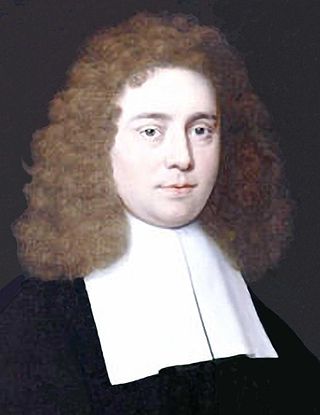
Johannes Munnicks or Jean Munniks, Munnix, Munnicx, Munnigk, Munick, Jan Munnickius was a Dutch Golden Age medical doctor and writer from the Northern Netherlands.

Adriaan Kluit was a Dutch scholar, important in Dutch linguistics. He was born in Dordrecht. He was rector of the Latin school in Alkmaar and Middelburg. In 1779 he became the professor of history at the University of Leiden, remaining there until his death.

The Prussian invasion of Holland was a military campaign under the leadership of Charles William Ferdinand, Duke of Brunswick, against the rise of the democratic Patriot movement in the Dutch Republic in September–October 1787 with the aim of disempowering the patriots and disarming the Free Corps, as well as reinstating the William V of Orange as hereditary stadtholder in the Dutch Republic.
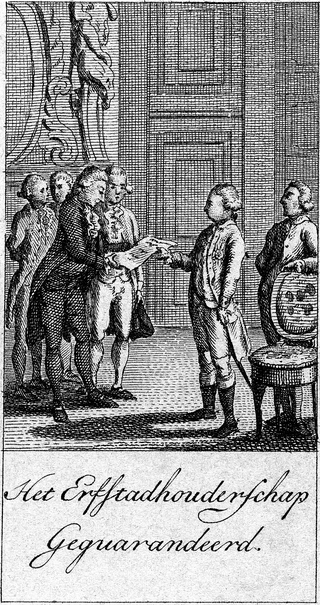
The Act of Guarantee of the hereditary stadtholderate was a document from 1788, in which the seven provinces of the States General and the representative of Drenthe declared, amongst other things, that the admiralty and captain-generalship were hereditary, and together with the hereditary stadtholderate would henceforth be an integrated part of the constitution of the Dutch Republic. Moreover, members of the House of Orange-Nassau would have the exclusive privilege to hold the office. The Act was in force until the Batavian Republic was established in 1795.
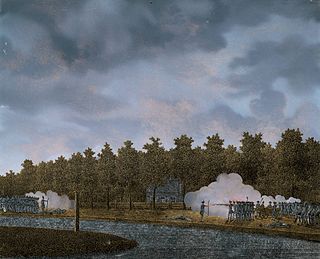
The Battle of Jutphaas, also known as the Battle of the Vaart or the Battle of Vreeswijk, occurred on 9 May 1787 on the banks of the Vaartsche Rijn canal near Jutphaas and Vreeswijk between Orangists and Patriots.
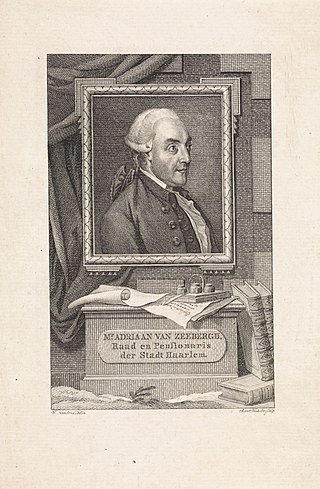
Adriaan van Zeebergh was a Dutch politician during the Patriottentijd.
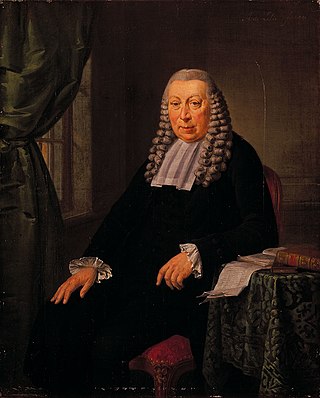
Hendrik Daniëlszoon Hooft, Ambachtsheer of Urk and Emmeloord was a Dutch politician during the Patriottentijd.
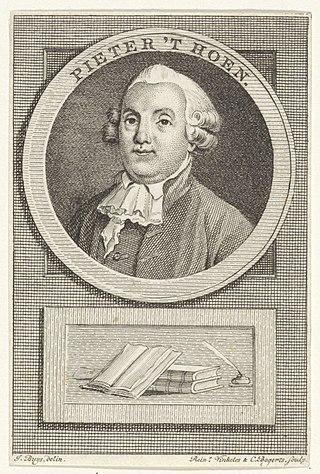
Pieter 't Hoen was a Dutch journalist, poet, and politician who played an important role during the Patriottentijd as the editor of De Post van den Neder-Rhijn.

Joachim Rendorp, Vrijheer of Marquette was a Dutch politician of the Patriottentijd in the Dutch Republic.

The siege of Breda took place from 21 to 27 February 1793 in the course of the Flanders Campaign during the War of the First Coalition.
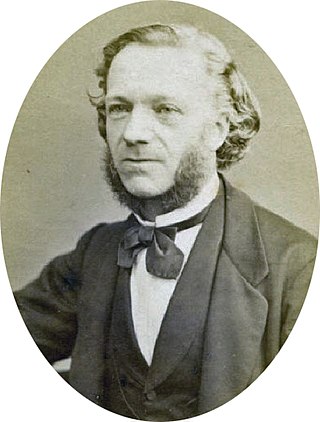
Jan Hendrik Maronier was a Dutch pastor and writer.
























